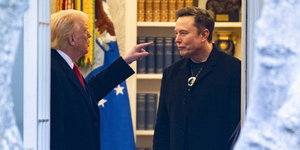There will be no reconciliation without empathy for the Slovaks
Slovakia's reinforcement of the Benes Decrees cannot be allowed to bass without comment, but Hungary must not forget it is arguing with a young state that is still creating its national identity, says Tamas Stark, 48, a historian, who believes diplomatic relations between the two countries are worse than the day-to-day dealings.
Intellectuals in the Hungarian-speaking part of Slovakia have been heard to say that it was a mistake for Slovakia's Hungarian Coalition Party (MKP) and its leader Pal Csaky to issue a declaration calling on the two countries to apologise to each other. Do you think it contributed to the strengthening of the Benes Decrees in Slovakia?
T.S.: MKP signed up to the Slovak coalition saying it would not call for the Benes Decrees to be revisited. It was suggested that the party was trying to reposition itself, though I don't know. As a historian, I can say that something must be done - it mustn't be swept under the carpet. The question has been coming up regularly for years, and it will continue to do so, until somebody comes up with a solution that pleases both parties. The MKP's plan for mutually conciliatory declarations looks like such an attempt, and Hungary's parliamentary parties also welcomed it.
How does this political squabble colour everyday relations, for example in your work as a historian?
T.S.: I don't think Hungarian-Slovak relations are anywhere near as tense as the political arguments. Just the other day, Stefan Sutaj, a professor at the Social Science Institute of the Slovak Academy of Sciences came to give a talk to the Terror House Museum about Hungarians in Czechoslovakia. The Czech and Slovak ambassadors to Budapest just sent messages to the event. Even if anti-Hungarian sentiment always played an important role in Slovak identity, we can't generalise, saying that Slovaks see us as an enemy. To take a historical example, following World War II, the Slovaks took a completely different approach to the depatrified Hungarians than to the Germans, many of whom fled from the land of their birth. There were attacks on Hungarians, but you didn't see the kind of mass murders that happened to Germans living in the Sudetenland.
Talking of encouraging signs, do you see any chance of the joint history textbook proposed by Ferenc Gyurcsany and Robert Fico, the Slovak prime minister, appearing in short order?
T.S.: Let's not go too far. I know from a Slovak colleague that not everybody was pleased by this idea. But it's encouraging that more recent textbooks contain at least a few sentences about the persecution and partial deportation of Hungarians after World War II. Admittedly, works that take a more nuanced view of the period have very small print runs and are read by a very small group of people, so they have little effect on public opinion.
© Túry Gergely |
Why are the Slovaks so sensitive? Few EU member states would reinforce a political decision taken in a very different political environment that criminalises a nation.
T.S.: Decisions like that would be considered beyond the pale not just in the EU but in most countries of the world. Fico and his colleagues certainly know this. But they are hoping - with reason - that European public opinion will be indifferent to the matter, just like when the Czech parliament reaffirmed the Benes Decrees in 2002, regarding it as a complicated dispute between two central European peoples. The sad thing is that the current Slovak coalition, which has gained great popularity by playing with nationalist sentiment, will gain from this at the elections. It's no coincidence that even the opposition has been reluctant to criticise. Apart from a single Christian Democrat MP, not one of the 120 MPs in the country voted against the parliamentary resolution.
But in the case of Hedvig Malina, the Hungarian girl who was beaten, moderate Slovak intellectuals raised their voices. Why aren't they doing this now?
T.S.: To understand the Slovaks, you have to realise that this is a very young state. Apart from a short period between 1939 and 1945, Slovakia has only been independent since 1993. Slovak identity is still being built, and a sense of national martyrdom is playing an important role. Many see Slovak history as one of unending suffering, with Slovaks being strangers in their own lands for centuries, suffering under Hungarian rule. There was a fierce policy of Hungarianisation under dualism, and the result was that the Slovak school system shrunk to a fifth of its original size over a couple of decades. When Czechoslovakia was created in 1918, Slovaks moved from one kind of subordination to another. The Vienna decision of 1938, which gave Hungary some of Slovakia, was another trauma. But our name for that region, Felvidek, or Upper Hungary, annoys them too. There are more recent wounds. Sending in the soldiers in 1968, the Danube dam, which also makes them feel they drew the shortest straw.
An inferiority complex could be considered understandable after so many difficult centuries. But how did Hungary help bring about the current fears? Our opposition complains Gyurcsany's government abandoned the Hungarian minorities in neighbouring countries, by abolishing the government department responsible for them, merging lots of foundations and refusing to summon the Hungarian Standing Commission.
T.S.: The current reaffirmation of the Benes Decrees partly reflects the fear that with Schengen, the borders between the two countries will become virtual - and here, many people talk of that moment as a kind of historical redress, a way of reuniting the nation. Even though the Slovaks know well that the borders will remain, the thought sends shivers down their spine. But you have to see that when the government keeps talking about a growing fascist threat in Hungary, it's a double-edged sword. Here, it might be useful political ammunition, but it also feeds extremist, nationalist forces abroad, who will use it as a weapon in their propaganda campaign against Hungarians and Hungary itself.
As a historian, what solution do you see?
T.S.: I don't expect any dramatic improvements in the short term. We have to wait for Slovakia to overcome the strong emotions it is going through in its nation-building phase. They have to accept that the virtualisation of the borders does not mean they will disappear, and they have to accept that Hungary has no aggressive intentions. The ball's in their court. We have to be patient, which doesn't mean we should keep our opinions to ourself. But it's clear that there will be no reconciliation without our empathy, nor will there be if our northern neighbours allow emotion to conquer reason.
JÁNOS DOBSZAY

















